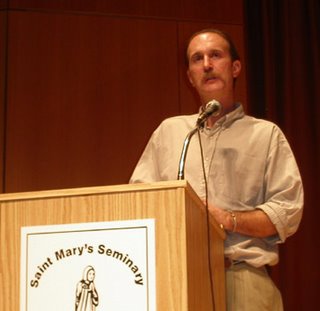The continuing Tuesday's Focus series today looks at the story of Renny Cushing:
Renny Cushing is the founder and Executive Director of Murder Victims’ Families for Human Rights. His father’s murder in 1988 has shaped his work as an advocate for crime victims and as an opponent of capital punishment.
As a victim-abolitionist Renny has been a pioneer in the effort to bridge death penalty abolition groups and the victims’ rights movement. He travels throughout the U.S. and the world speaking with and on behalf of victims who oppose capital punishment.
He has testified before the U.S. Congress and several state legislatures on victims’ issues and the death penalty, articulating policies that promote violence prevention, meet the needs of crime victims, and end state killings. He has written and lectured extensively and is the co-author of
Dignity Denied: The Experience of Murder Victims' Family Members Who Oppose the Death Penalty, and
I Don’t Want Another Kid to Die, a collection of homicide family members' voices against the juvenile death penalty. He also appears, along with many other MVFHR founding members, in
Not In Our Name, a collection of profiles of murder victims’ families who oppose executions.
A lifelong social justice activist, Renny has been a Justice of the Peace for the past 25 years. He served two terms in the New Hampshire House of Representatives, where he was involved in victims’ issues and sponsored a measure that would have abolished the death penalty in that state. Renny wrote the Whistleblower’s Protection Act, a groundbreaking law providing assistance to victims of domestic violence. He also supported the passage of laws establishing a victims’ bill of rights, victims’ advocate programs, and a victims’ compensation fund. In 2001, as plaintiff in
Cushing v. McLaughlin, he was successful in a landmark state court case brought to enforce New Hampshire’s Victims Bill of Rights law.
Links to Renny’s Journey
Breaking the Cycle of Violence from Amnesty Now, 1999 Forgiving the Unforgivable, the story of the murder of Robert Cushing, Sr.Not in Our Name, homicide survivors Renny Cushing and Bud Welch speak out against the death penalty at Harvard University, 1999
Statement of Renny Cushing Central Prison Raleigh, North Carolina December 1, 2005 Eve of the 1000th Execution in the US since 1976
The Good FightRenny Cushing to Visit Alaska in MarchPoster Boy For Abolition – McVeighRenny Cushing Quotes:
"A man come up to me after my father was murdered and said, "I hope they fry those people. I hope they fry them so you and your family can get some peace." I know that man meant to comfort me, but it was the most horrible thing he could possibly have said.
If we let murderers turn us to murder, we give them too much power. They succeed in bringing us to their way of thinking and acting, and we become what we say we abhor."
